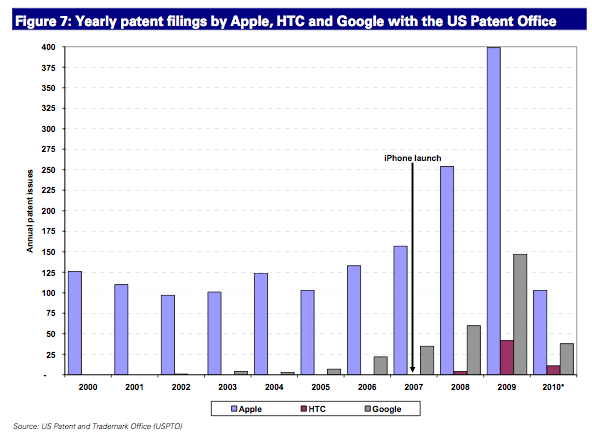By David Goldman:
Apple in early 2010 filed a number of legal actions against HTC claiming that their Android handsets employed technologies patented and owned by Apple.
Apple’s HTC lawsuit, not to mention it’s ongoing suits with Samsung and Motorola, is undeniably aimed at stalling the tremendous growth of Android which, if you believe Google CEO Larry Page, sees over 500,000 activations daily.
Apple presumably chose to go after HTC not only because its Android handsets are sleek and extremely popular, but because HTC’s patent portfolio is rather weak compared to Apple’s. To wit, Apple from 2004-2007 filed for 507 patents while HTC filed zero. Is it any surprise that HTC was the first company to sign a licensing deal with Microsoft who also asserts that Android handsets employ infringing technologies?

But Apple isn’t looking for royalty payments a’la Microsoft, it wants to put Android in its place – and so far, it’s doing quite well against HTC in court.
The ITC recently ruled that HTC handsets are in violation of two Apple patents that go to the core of the Android OS. In other words, the patents at issue don’t relate to superfluous technologies and features that can easily be removed and/or replaced.
And whadya know, after weeks and months of posturing and vowing to vigorously defend itself against all patent claims, HTC this week changed its tune when its CFO Winston Yung said that the company would be open to signing a licensing agreement with Apple.
But in an interesting twist, note that HTC recently purchased a company called S3. An ITC judge recently ruled that OS X infringes upon two patents held by S3 and now owned by HTC.
Mac computers have an operating system that infringes two S3 patents related to graphics chips, U.S. International Trade Commission Judge James Gildea said.
Closely held S3, which agreed this month to be bought by Taiwanese smartphone company HTC Corp. (2498), makes image-compression technology. If Gildea’s decision is upheld in a review by the full six-member commission, the ITC can ban U.S. imports of some Macs, which generated $17.5 billion in sales last fiscal year, or 27 percent of Cupertino, California-based Apple’s revenue.
Macs that have Nvidia Corp. graphics processing units have an implied license to the patents, the judge said.
As a result, some pundits are claiming that HTC has some new found leverage in its legal battle against Apple. The reality, though, is that the ruling will do little to stave off Apple’s ongoing legal onslaught against HTC’s implementation of Google’s Android OS.
At the very least, Apple could simply equip its Macs with NVIDIA chips and put the kibosh on HTC’s attempts to extract a cross-licensing agreement with Apple. Moreover, it’s only Macintosh computers that were found to be infringing. Apple’s lineup of iPhones, iPods, and iPads are all in the clear.
For an detailed overview explaining why Apple most likely has nothing to worry about in light of HTC’s victory, check out the always informative Florian Mueller of FOSS Patents over here.





Wed, Jul 27, 2011
Legal, News